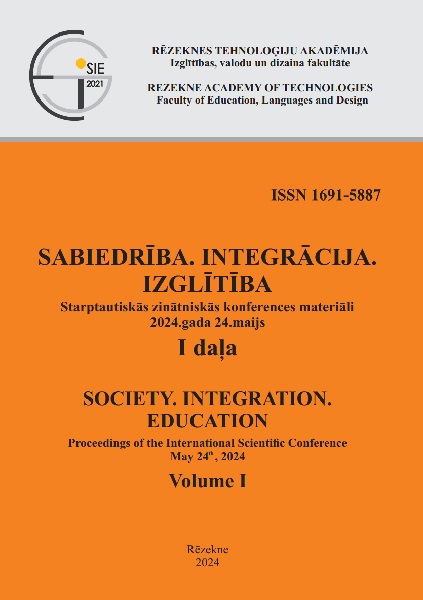MOTIVATING ROMA CHILDREN TO LEARN: AN ANALYSIS OF TEACHERS' EXPERIENCES
DOI:
https://doi.org/10.17770/sie2024vol1.7878Keywords:
learning motivation, parents, Roma children, teacherAbstract
A child's motivation to learn is one of the most important factors in planning, organising, implementing, and achieving the child's learning outcomes. The aim of this article is to reveal the motivation of Roma children to learn, based on the experience of educators working with Roma children. The type of qualitative research was chosen for the study, the research was collected using a semi-structured interview method, and the content analysis method was used to analyse the data. The research was carried out in accordance with the principles of research ethics: confidentiality, anonymity, and voluntary participation in the research. The research question: how do teachers motivate Roma children to learn? The study involved 21 teachers with experience of teaching Roma children.
The study identified that the motivation of a Roma child to learn is influenced on the one hand by the teacher's efforts to create an educational environment that motivates the child and meets the individual needs of Roma children, and on the other hand by the efforts of teachers to involve parents in the child's educational process by encouraging and assisting parents to create a learning-friendly environment at home.
The study reveals that when creating a motivating educational environment in the classroom, it is important for the teacher to accept the child as they are, to create a warm, respectful, equal relationship with the child, to interest the child, to use various incentives to emphasize the child's success, to differentiate and personalize activities, and to respond to the child's individual needs. When working with Roma children, it is important to do as many tasks as possible in the classroom, to enable them to do their homework at school and to use other pupils in the classroom to help motivate Roma children to learn and to overcome learning difficulties.
The results of the study show that teachers' efforts to involve parents in their child's education by encouraging and helping parents to create a learning environment at home is important to help Roma children to understand the meaning of learning, to show the benefits of learning now and in the child's future perspective. The study reveals that cooperation between parents and teachers, a shared approach to the child's learning, and a common understanding of what is required of the child are important for the child's motivation.
References
Astrauskaitė, M. (2008). Tėvai ir mokykla–atsakomybės dalybos. Aš ir psichologija, 4, 23-27.
Berns, R.M. (2009). Vaiko socializacija: šeima, mokykla, visuomenė. Vilnius: Poligrafija ir informatika.
Department of National Minorities under the Government of the Republic of Lithuania. (2021). Demographic Characteristics of Lithuania's. Retrieved from: http://www.romuplatforma.lt/romai-lietuvoje/bendra-informacija/
Gaižauskaitė, I., & Valavičienė, N. (2016). Socialinių tyrimų metodai: kokybinis interviu. Vilnius: Mykolo Romerio universitetas.
Gabrialavičiūtė, I., Raižienė, S., & Garckija, R. (2022). Geresnės mokinių motyvacijos link: Situacijų mokykloje klausimyno (SISQ) lietuviškos versijos pritaikymas Lietuvoje. Psichologija, 66, 79-94. Retrieved from: https://doi.org/10.15388/Psichol.2022.53
Gudžinskienė, V. (2011). Konstruktyvizmo ištakos Lietuvoje ugdant socialinius įgūdžius. Pedagogika, 103(3), 38-44.
Kováčová, L. (2015). Social Situation and Poverty of Roma. Creative & Knowledge Society, 5(1), 16–35. Retrieved from: https://doi-org.skaitykla.mruni.eu/10.1515/cks-2015-0003
Macura, S., & Dimitrijević, B. (2016). Cross-cultural field experience as a pre-service teacher preparation strategy for teaching Roma pupils in Serbia. (English). Journal of Contemporary Educational Studies / Sodobna Pedagogika, 67(2), 46–63.
Peček, M., & Munda, M. (2015). Roma pupils’ attitudes towards education – a case study. Intercultural Education, 26(5), 425–443. Retrieved from: https://doi-org.skaitykla.mruni.eu/10.1080/14675986.2015.1091237
Pescaru, C.M. (2018). School Abandonment at the Level of Roma Populantion. Revista Universitară de Sociologie, 14(2), 120–129.
Randi, J., & Corno, L. (2022). Addressing student motivation and learning experiences when taking teaching online. Theory Into Practice, 61(1), 129–139. Retrieved from: https://doi-org.skaitykla.mruni.eu/10.1080/00405841.2021.1932158
Reece, I., & Walker, S., (2007). Teaching, training & learning. A practical guide. 6th ed revised. Tyne and Wear: Business Education Publishers Ltd. Survutaite D. (2023). Education of Roma Children: Situation and Possibilities for Overcoming. Retrieved from: https://www.nsa.smm.lt/wp-content/uploads/2023/05/Romu-vaiku-ugdymas-viesinimui.pdf
Saeed, S., & Zyngier, D. (2012). How Motivation Influences Student Engagement: A Qualitative Case Study. Journal of Education and Learning, 1, 252-267. https://doi.org/10.5539/jel.v1n2p252
Tonković, A., Pongračić, L., & Lončar, M. (2022). Factors for Readiness of Roma Children for the School. Journal for Pedagogical & Educational Matters / Školski Vjesnik, 71(2), 77–90.
Natividad-Sancho, L., Gairal-Casadó, R., Sordé Martí, T., & Garcia Yeste, C. (2023). Roma students’ experiences: practices contributing to participation in post-compulsory education. Educational Research, 1-16. DOI: 10.1080/00131881.2023.2266455 Vilnius City Municipal Council. (2020). Vilnius Roma Integration into Society Program 2020–2023. Retrieved from: https://aktai.vilnius.lt/document/30344382
Wang, S., Rubie-Davies, C. M., & Meissel, K. (2018). A Systematic Review of the Teacher Expectation Literature Over the Past 30 Years. Educational Research and Evaluation, 24, 124–179. Doi:10.1080/ 13803611.2018.1548798
Wiliam, D., & Siobhan, L. (2015). Embedding formative assessment: Practical techniques for K-12 classroom. The United States of America: Learning science international.






